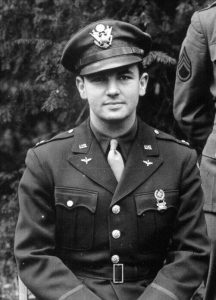WORLD WAR II VETERANS CONCORDIA PARISH LOUISIANA
ARMY AIR FORCE PERCY ROUNTREE
EUROPE
Headquarters 2nd Division, 8th Air Force Captain Base Adjutant
330th Squadron, 93rd Bomb Group, 8th A. F. Major Executive Officer
Today (September 11, 2002) we commemorate the unwanted and cowardly devastation brought to our homeland a year ago. We will never forget and we cannot forgive. In thinking about our past experiences, memories of World War II fill much of my thoughts by day and dreams by night. I graduated from LSU in 1941 — was much more interested in military as an ROTC Cadet, Lt. Colonel, Infantry than I was in my major subject — Journalism.
At this time I was only 20 years old and couldn’t accept my commission as a 2nd Lieutenant in the Army until I became 21. This was a real disappointment, but I immediately got a telegram and then an official letter saying that if I would take my commission in the Air Corps instead of the Infantry, that they would order me to active duty immediately. I wired back that same day with, “Yes sir, I will.” I was ordered to Kelly Field, San Antonio, Texas where the Air Corps was getting ready for war.
Then came the infamous sneak attack on Pearl Harbor, where we briefly lost our Naval superiority to Japan. We were now at war with Japan, Germany and Italy. I left Kelly Field, and my wife and daughter, as a Captain in early 1943, going by train to Canada, and down to New York Harbor; then on a rough trip to Newfoundland, Greenland, Iceland and Scotland on the smallest troop ship in the convoy. From there to East Anglia England and the 8th Air Force, right on the North Sea across from Belgium.
The Eighth became the biggest Air Force in the world, commanded by General Jimmy Doolittle. There were three divisions; the First and Third with B-17 “Flying Fortress” bombers and the Second with B-24 “Liberator” bombers. I was at headquarters of the 2nd Division at Norwich, about 120 miles northeast of London. My job there was Base Adjutant, Assstant to the Base Commander, with additional duty as Station Defense Officer (because of my infantry training.)
Later, I was with the 93rd Bomb Group in England for about 2 ½ years. There, now a Major, I was Executive Officer of the 330th Squadron, 93rd Bomb Group.
When I first got to England in 1943, the German Luftwaffe had control of the skies and hit us every day and night with bombers, then with flying Buzz bombs and later with V-2 rockets.
As time went on, with the RAF “area” bombing at night and the U.S, Air Force “precision” bombing by day, we began to take command of the skies over Europe. This prepared the way for our invasions, first in North Africa, then Italy, and finally the beaches of Normandy, France. This opened a tough door into Germany.
As the B-24s, B-17s, the medium bombers and the RAF continued to devastate the German war machine, the end became in sight. When the war with Germany ended, the 8th Air Force came home to Sioux Falls, South Dakota to refit the B-29s. While waiting to return to the U.S. General Doolittle said that every soldier needed to know how to shoot. So he called for teams from every Bomb Group into rifle, pistol and skeet competition. My teams from the 2nd Division won the rifle and pistol competitions and were second in skeet. I was the only man on all three teams, scoring 2nd high with rifle, 4th with pistol and 1st in skeet. I am quite proud of this record, because this competition was for the entire 8th Air Force, the largest Air Force in the world.
We went to South Dakota as scheduled, and were ready to fly to Okinawa, Japan when the nuclear bombs were dropped. I stayed in the Air Force a few more months, then got out, but stayed in the Reserves.
I retired in 1961 after 20 years in the Air Force Reserve as a Lieutenant Colonel. If we do get into it again, I plan to ask for a mobilization assignment, like I had during the Korean War. I am 81 and in pretty good shape? My wife of 60 years says that is debatable.

Captain Rountree of the 2nd Division Rifle Team
Leave a Reply